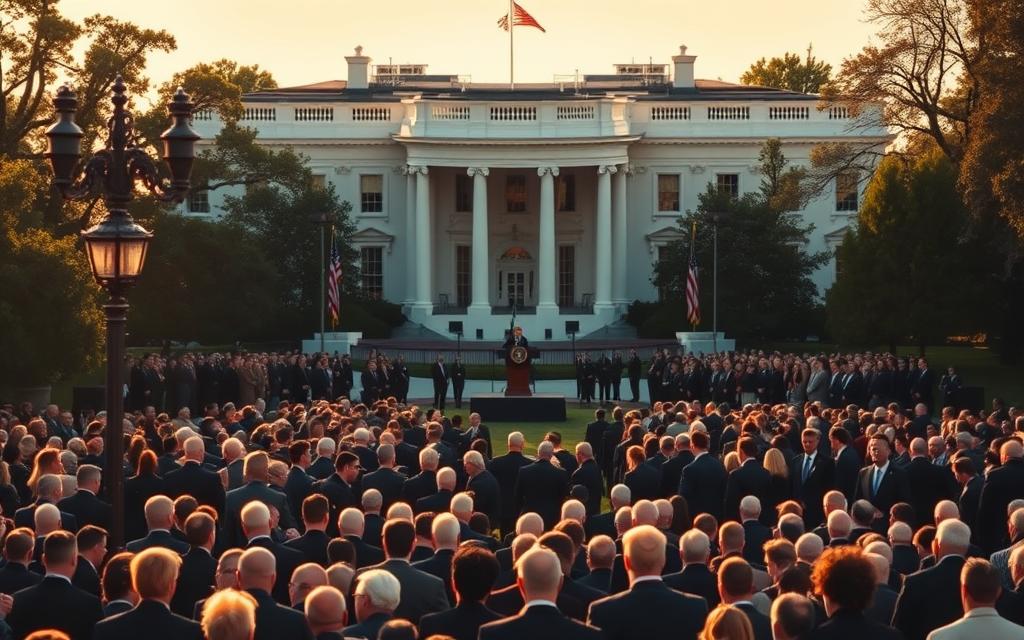Table of Contents
President Donald Trump will host a landmark event at the White House on March 7, 2025. This gathering marks his first major policy initiative on digital assets since taking office.
The crypto summit follows the signing of an executive order establishing a Strategic Bitcoin Reserve. Attendees include top industry executives and key policymakers shaping America’s financial future.
This exclusive meeting fulfills campaign promises to support blockchain innovation. Recent regulatory shifts at the SEC make the timing particularly significant for market participants.
Trump’s White House Crypto Summit: Event Overview
The West Wing will serve as the backdrop for a high-profile gathering on digital assets. This crypto summit march event brings together 50+ cabinet officials and industry leaders under strict security protocols.
Exclusive Venue and Security
The White House’s West Wing will host the meeting, with unprecedented measures in place:
- Biometric checks for all attendees
- Dedicated cybersecurity teams monitoring transactions
- No personal devices permitted in the briefing room
Policy Objectives and Impact
A Strategic Bitcoin Reserve—funded by $17B in forfeited assets—aims to stabilize markets. The administration’s executive order bars government BTC sales without approval.
Bo Hines’ working group seeks to replace vague rules with a clear regulatory framework. This shift reverses previous banking restrictions, unlocking new opportunities for blockchain innovation.
Key Speakers and Attendees at the Crypto Summit
The administration’s newly appointed crypto czar leads a powerhouse delegation of blockchain innovators. David Sacks, a venture capitalist turned policy architect, will coordinate with MicroStrategy’s Michael Saylor on treasury strategies.

Crypto Czar David Sacks and the Working Group
Sacks’ dual role bridges Silicon Valley and Washington. His working group includes:
- Ex-SEC officials drafting exchange guidelines
- Banking lobbyists reversing legacy restrictions
- VC investors funding the Strategic Bitcoin Reserve
83% of attendees helm firms valued over $1B+, per White House disclosures. Over half donated to the 2024 campaign, signaling aligned interests.
Industry Leaders: Winklevoss Twins, Brian Armstrong, and More
The Winklevoss twins will propose simplified IRS reporting for digital asset transactions. Meanwhile, Coinbase’s Brian Armstrong advocates for stablecoin clarity post-SEC case dismissal.
| Attendee | Role | Policy Focus |
|---|---|---|
| David Sacks | Crypto Czar | Regulatory Framework |
| Winklevoss Twins | Gemini Founders | Tax Compliance |
| Brian Armstrong | Coinbase CEO | SEC Reform |
This assembly marks a pivotal shift from adversarial regulation to collaborative innovation in bitcoin and blockchain policy.
Major Policy Announcements and Executive Actions
The White House unveiled sweeping changes to digital asset regulations, reshaping the financial landscape. These measures aim to strengthen America’s position in the global crypto industry while addressing ethical concerns.
Establishment of the Strategic Bitcoin Reserve
President Trump signed an executive order creating a national bitcoin reserve funded by seized assets. The Treasury Department will manage $17 billion in forfeited digital assets, including 37% from Silk Road seizures.
Key impacts of the reserve:
- Prevents premature government BTC sales that previously cost taxpayers billions
- Stabilizes markets by holding assets long-term
- Requires full disclosure of all federal digital asset holdings
According to the White House fact sheet, this marks the first official recognition of bitcoin as a strategic national resource.
Regulatory Shifts and SEC Appointments
The Securities Exchange Commission underwent dramatic changes under new chair Paul Atkins. Within weeks, the agency:
| Action | Impact |
|---|---|
| Dropped Coinbase/Kraken cases | Cleared path for exchange innovation |
| Launched “innovation sandbox” | Allowed startups to test products without penalties |
| Revised token classification | Reduced legal uncertainty for crypto investors |
These moves reversed several Biden administration policies that industry leaders considered restrictive.
Controversies: Trump’s Memecoin and Conflicts of Interest
The $TRUMP memecoin surged 400% after summit details leaked. Critics point to potential conflicts:
- Melania Trump’s NFT partners received summit invitations
- World Liberty Financial (a Trump-affiliated firm) faces FTC scrutiny
- Democrats introduced the Conflict in Crypto Act targeting officials’ holdings
Despite these concerns, the administration maintains all decisions prioritize national economic interests over personal gain.
Conclusion: Implications for the Crypto Industry
The United States stands at a pivotal moment for digital assets adoption. Goldman Sachs predicts a $50B surge in the crypto market cap, while 14 states now accept bitcoin for tax payments.
Long-term, the industry could see 500,000 new jobs by 2026. Yet challenges loom, like potential clashes between private crypto and government-backed CBDCs.
State-level laws may spark a domino effect, but unregulated memecoins pose risks. The IMF warns of regulatory arbitrage as nations compete for blockchain talent.
This shift reshapes how investors and policymakers engage with digital assets—balancing innovation with oversight.
FAQ
What is the date of President Donald Trump’s upcoming crypto summit?
The event is scheduled for March 2025 at the White House, focusing on digital assets and regulatory clarity.
Who will be speaking at the White House crypto summit?
Key figures include Crypto Czar David Sacks, prominent founders like Brian Armstrong, and industry leaders such as the Winklevoss twins.
What policy changes are expected from the summit?
Major announcements include the Strategic Bitcoin Reserve initiative and new SEC appointments to streamline regulations.
How will the summit impact crypto investors?
The event aims to boost market confidence through clear policies, potentially influencing digital asset valuations and adoption.
What role does David Sacks play in the administration’s crypto strategy?
As the newly appointed Crypto Czar, Sacks leads a working group shaping U.S. policy on blockchain and digital assets.
Are there concerns about conflicts of interest at the summit?
Some critics highlight Trump’s memecoin ties, but the administration emphasizes transparency in decision-making.









